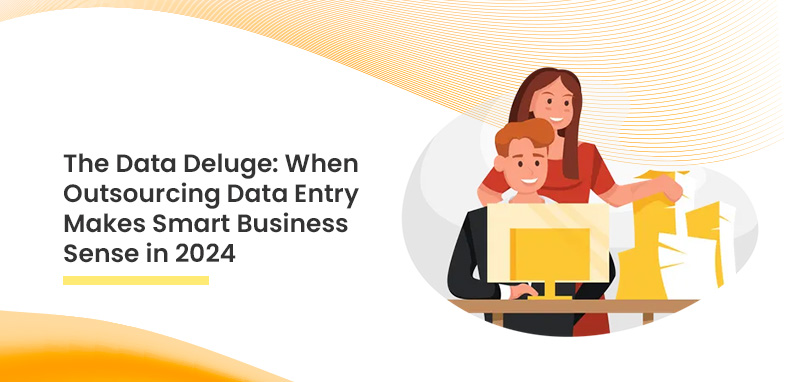The Data Deluge: When Outsourcing Data Entry Makes Smart Business Sense in 2024
The “data deluge” can be both a blessing and a challenge. Businesses need data to make informed decisions, understand customer behaviors, improve products, and strategize future growth. However, managing and processing such large volumes of data often demands substantial time and resources. As we move into 2024, outsourcing data entry services has become an attractive solution for businesses of all sizes, enabling them to handle data efficiently without overburdening internal teams. This blog explores why outsourcing data entry makes strategic sense in the modern business landscape.

The Need for Data Management in a Data-Intensive World
The growth of digital platforms, analytics, customer relationship management (CRM) systems, and IoT devices has exponentially increased the amount of data companies need to manage. From customer interactions to supply chain data and marketing insights, businesses are required to organize, process, and extract value from data to stay competitive. This data processing requires accuracy and a keen eye for detail; even minor errors can lead to significant consequences, including missed business opportunities or compliance risks.
Why In-House Data Entry May Not Be Sustainable
Maintaining an in-house data entry team can be both costly and resource-intensive. Beyond the expenses of salaries, benefits, and training, companies must also consider infrastructure costs, including office space, software licenses, and data security measures. This setup may work for large organizations with dedicated resources, but for most small and medium-sized businesses, managing these resources internally can divert valuable time and energy away from core business activities. Furthermore, employees may find data entry monotonous, leading to low productivity and a higher risk of errors.
Outsourcing data entry offers a cost-effective and efficient solution, allowing companies to focus on their strengths while leaving data management to trained professionals. The strategic benefits of outsourcing become even more apparent when we consider the evolving data landscape of 2024, where accuracy, scalability, and speed are paramount.
Key Benefits of Outsourcing Data Entry in 2024
Cost Efficiency and Operational Savings
Outsourcing data entry allows businesses to avoid overhead costs associated with hiring, training, and maintaining in-house staff. This can be particularly advantageous for businesses with fluctuating data needs. Instead of paying full-time salaries, companies only pay for the specific data services they need. In competitive markets, these savings can be directed toward growth initiatives, such as new product development or market expansion.
Enhanced Focus on Core Business Activities
Data entry tasks, though essential, can be repetitive and time-consuming. By outsourcing these tasks, companies can allow their in-house teams to focus on core competencies such as customer service, product innovation, and strategy. This shift can lead to improved productivity, as internal teams are no longer bogged down by data entry tasks and can focus on higher-value activities that directly contribute to the company’s growth.
Access to Specialized Expertise and Technology
Outsourcing providers are equipped with the latest tools, technologies, and skilled professionals trained specifically in data management. These providers stay updated with industry best practices and compliance standards, ensuring data is processed accurately and securely. By leveraging outsourcing, businesses gain access to expertise that would otherwise require significant investment. This can be particularly beneficial for companies that handle sensitive data, as professional outsourcing partners prioritize data integrity and quality.
Improved Data Accuracy and Reliability
Accuracy is critical in data entry; errors can lead to misguided strategies, poor customer service, or compliance issues. Outsourcing providers use advanced quality control processes, such as dual-key entry and data verification, to ensure high levels of accuracy. Outsourcing reduces the risk of human error and enhances data reliability, enabling businesses to make informed decisions with confidence.
Data Security and Compliance
With rising concerns about data privacy and regulations like the GDPR, data security has become a top priority for companies. Reputable outsourcing partners prioritize data protection and invest in strong cybersecurity measures, including encryption, restricted access, and regular audits. Partnering with a trustworthy data entry service provider can mitigate the risk of data breaches and ensure compliance with legal requirements, providing peace of mind to business leaders.
Conclusion:
In 2024, the importance of effective data management cannot be overstated, and outsourcing data entry provides a viable path for businesses to streamline their operations and stay competitive. By outsourcing, companies benefit from reduced costs, improved focus, scalability, accuracy, and enhanced data security. For companies large and small, outsourcing data entry services is more than a trend; it’s a strategic move that can make a real difference in their ability to thrive amidst the data deluge.
